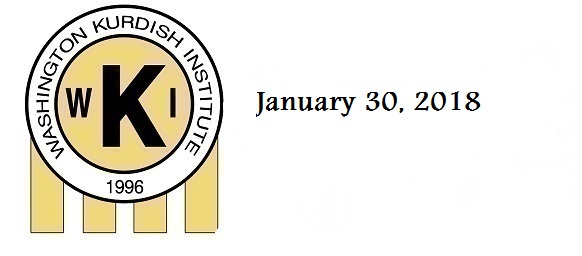948
Iran
- After the recent anti-government protests, the Iranian government is still detaining hundreds of Kurdish activists. Meanwhile, the government has sentenced two Kurdish youth to death for being members of Kurdish opposition parties in Sheno and Sanandaj.
- In Kermanshah, several Kurdish citizens, including a two-year old, who were displaced by the November 2017 earthquake have died due to lack of resources and aid from the Iranian government, according to the Kurdistan Human Rights Association. With lack of proper shelter, exposure to freezing cold temperatures, and increased contact and lack of treatment for various diseases and viruses, the displaced people of Kermanshah are at a high risk for illness and death.
Iraq
- A delegation from the Kurdistan Regional Government (KRG) participated in the World Economic Forum in Davos. KRG Prime Minister Nechirvan Barzani and Deputy Prime Minister Qubad Talabani held meetings with several world leaders, including U.S. Secretary of State Rex Tillerson, Canadian Prime Minister Justin Trudeau, and German Federal Minister of Defense Ursula von der Leyen. The KRG delegation also held a meeting with Iraqi Prime Minister Haider Al Abadi, for the second time in two weeks, in order to address the disputes between the KRG and Baghdad. Of the meeting, Barzani said “in these important meetings, we discussed the latest developments and also the committees that have been formed between both the Kurdistan Region and Iraq,” adding that “airports bans, salaries, and dams were also discussed.” On Monday, the Iraqi Parliament lifted sanctions on the Kurdistan region’s banks, which had been implemented following the KRG’s independence referendum. The international flight ban on the Kurdistan region, however, still remains in place.
- The KRG Parliament held a session to discuss the recent military campaign and the attack by Turkey on the Kurdish city of Afrin in Syria. The Change block (Gorran) boycotted the session as they demanded action from the Parliament such as reopening crossings between the Kurdistan Region and Syrian Kurdistan (Rojava). On Monday, hundreds of people in Sulaymaniyah city held a demonstration in support of the people of Afrin. Demonstrators chanted slogans against Turkey’s invasion.
Syria
- The Turkish military invasion of the Afrin region in Syria continued into its 10th day. More civilians were killed, especially because of the intense Turkish strikes, which included the use of napalm. In the past week, 60 people (29 men, 12 women and 19 children) were killed, while 145 have been wounded by the Turkish military and its Syrian Islamist proxy militias. Meanwhile the U.S. backed Syrian Democratic Forces (SDF) announced the death of 43 fighters, including 8 women fighters from the Women’s Defense Units (YPJ). The SDF and the Kurdish media outlets recently published GRAPHIC Photos of the civilian victims. The Turkish attacks concentrated on the north (Bulbul district) and northwest (Rajo District) sections of Afrin. The SDF announced that the Turkish military has dropped about 700 rockets and shells since the beginning of the operation. There were also artillery attacks by various Syrian jihadi groups backed by Turkey, east of Al Bab, in the village of Shalah. On several occasions, the Northern Syrian Administration called on the international community to stop these brutal, unjustified attacks from a NATO member, Turkey. On Monday, a U.S. general rejected the numerous calls and threats from Turkey for the U.S. to pull its troops out of Manbij. In addition, the U.S. Secretary of Defense said that Turkey’s offensive on Afrin distracts from the fight against ISIS. The Syrian Kurds have decided to boycott the Russian-sponsored Syrian Civil War peace talks in Sochi, Russia — specifically because of Russia’s green-lighting of Turkey’s attack on Afrin.
Turkey
- After criticizing the government on social media for its invasion of Afrin in Syria, Turkish police arrested more than 300 people. Those arrested stand accused of spreading “terror propaganda.” In addition, the Turkish Medical Association (TTB) criticized the military invasion and called for immediate peace. But in response to this statement, Turkey’s President Recep Tayyip Erdogan described the TTB and its doctors as traitors and terrorists. The Pro-Kurdish Peoples’ Democratic Party (HDP) condemned Turkey’s invasion of Afrin and criticized the government for collaboration with Syrian jihadi militia groups. The HDP called upon the international community to “take a principled stance and not remain silent in the face of such an attack on the Kurds in Syria, who have sacrificed many lives in the fight against the ISIS.” Meanwhile HDP Foreign Relations Officer Hişyar Özsoy described the military campaign as a means for Erdogan to whip up domestic, nationalistic support for his upcoming presidential campaign.
- In Istanbul, a group of government supporters attacked an HDP office in Pendik district. Although no one was killed, the attack resulted in extensive property damage. The attackers also drew racist writings on the office walls after breaking all the windows and doors.
- The Turkish government sentenced former lawmaker Hasip Kaplan, a Kurd, to three years in prison for “terror propaganda.” Kaplan is also one of the main lawyers for jailed HDP Co-Chair Selahattin Demirtas.

